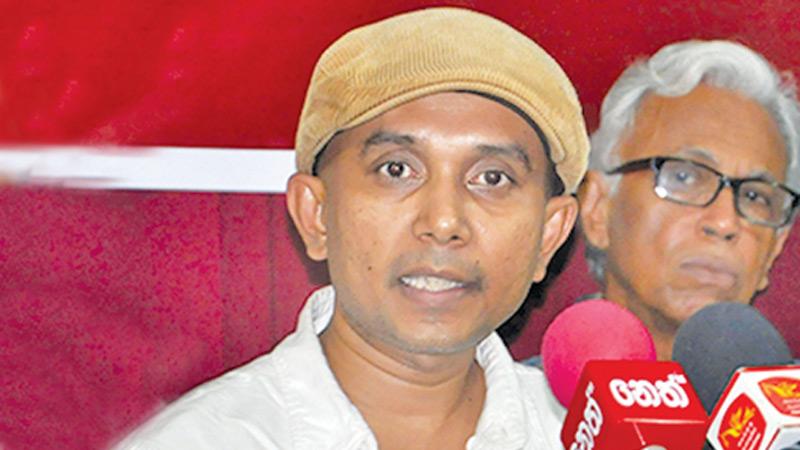
Award-winning Sri Lankan playwright Malaka Dewapriya had a close shave this week when he was let off after being interrogated for nearly four hours by the Police Organised Crimes Division about a radio drama production by him.
It mattered little that Dewapriya was recognised twice as the Best Radio Drama writer at the state drama festival and that his feature film Bahuchittawadiaya (The Undecided) won the special jury award for the best direction at the eighth SAARC Film Festival 2018 and had been screened at several international festivals. He became the second artist after Author Shakthika Sathkumara to be investigated by the Police this year under the International Covenant on Civil and Political Rights (ICCPR) Act.
The Police are investigating the possibility of initiating action against Dewapriya under Section 3 (1) of the ICCPR Act No.56 of 2007 and Sections 291A and Section 291B of the Penal Code. Law enforcement in Sri Lanka has come under fire in the recent times for misusing the UN-backed ICCPR Act and for carrying out a witch hunt against artistes and journalists at the behest of hardline Buddhists.
The investigation against Dewapriya commenced last year after Buddhist Information Center Director Angulugaha Jinananda Thera lodged a complaint claiming that the artiste had insulted Buddhism through his ‘Kanata Paarak’ (Earful of Visuals) radio drama which had been broadcast on a national radio channel.
The titles used for several radio teledrama episodes sponsored by the Office of National Unity and Reconciliation (ONUR) and written by Dewapriya, had earned his wrath. The monk labelled the show as Anti-Buddhist and an insult to the religion.
The phrases offending him were ‘Tharuwan Saranai’ and ‘Nihon Sapa Labewa’ which was the creator’s twist on the regularly used Buddhist and Pali phrases ‘Theruwan Saranai’ and ‘Niwan Sapa Labewa’ in a bid to elicit satire.
However, the content of the radiosdramas was far from religious. The episode ‘Tharuwan Saranai’ (Blessed by a star) speaks of public obsession with superstars and reality shows while ‘Nihon Sapa Labewa’ (May you attain comforts of worldly life in Japan) is a take on consistent attempts by Lankan youth to emigrate to Japan in search of greener pastures.
According to Dewapriya’s lawyer and Chairperson of the Action Committee for the Defence of Freedom of Art and Expression, Sanjaya Wilson Jayasekara, the major backlash and criticism following Shakthika Sathkumara’s arrest was perhaps the reason which prevented Dewapriya’s possible arrest this week. “The massive local and international campaigns against Shakthika’s arrest has made the government take a step back,” he said.
Award-winning scribe Shakthika Sathkumara like Dewapriya also fell foul with hardline Buddhist this year after writing a short story titled ‘Ardha’ about sexual abuse and paedophilia involving a member of the Buddhist clergy.
A complaint by Angulugaha Jinananda Thera once again led to the author being detained for nearly four months under the ICCPR Act of 2007 which only allowed bail to be granted by a High Court leaving Sathkumara to languish in remand prison before being released in August. “The same fate would have befallen Dewapriya if people had not risen against this crackdown,” Jayasekara said.
Author and Civil Society activist, Gamini Viyangoda expressed his dismay that the suppression of artistes should happen under the good governance government.
“They set a bad precedent by arresting Shakthika, and if this can happen under good governance, then a dictator who may come into power would misuse this law even further,” he said. According to him, the ICCPR is meant to protect rights. “The suppression of artistes based on the claims of religion or individual cannot be accepted,” he said.
Shakthika told the Sunday Observer that it has become a trend to arrest artistes at the behest of extremists. “If they feel any artwork is anti-Buddhist they complain and use their civil powers to suppress artistes,” he said.
According to him, this has instilled fear in artistes, while also causing confusion about Buddhism among the populace as it is a religion that encourages freedom of thought.
“If these extremist elements get stronger, will artistes have to leave the country?” he questioned. “Freedom of expression must be protected at all costs,” he added.
Jayasekara agrees as he warns that if this situation may not be temporary, the danger continues to loom over the local art industry.
“The summoning of Dewapriya shows the danger against artistes and freedom of art as well as expression,” he noted. He says this is an attack on progressive art in the country.
According to him, there is a necessity to fight against what he labelled as a witch hunt by building a mass movement to defend the freedom of art and expression in Sri Lanka.
